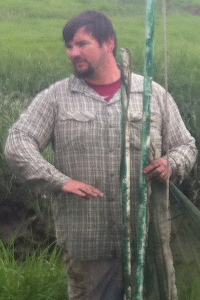Faculty Spotlight: James Nelson

James Nelson, PhD joined the Biology Department at the University of Louisiana at Lafayette as an Assistant Professor in August 2015. He received his PhD in Chemical Oceanography in 2011 and his BS in Biology in 2004 from Florida State University.
James Nelson, PhD, is an interdisciplinary scientist who uses a combination of field surveys, experimental approaches, stable isotope analysis, and mathematical modeling to quantify the functional role of marine organisms in mediating energy flow, biogeochemical cycles, and community structure in coastal and estuarine ecosystems. Although higher trophic level organisms are acknowledged as important in structuring communities and moving energy in ecosystems, the mechanisms and magnitude of their impact is still poorly understood. Recent work suggests a need to more closely examine the ability of animals to significantly impact the flow of materials within and between communities and ecosystems. While nutrient limitation sets the maximum potential ecosystem productivity, the realized productivity is mediated by organisms responding to both biotic (e.g., species interactions) and abiotic (e.g., hydrologic regimes) forces. To address these questions, he studies the response of coastal marine organisms and food webs to changes in both biotic and abiotic processes that are either the direct result of human actions or consequences of climate change, with a particular interest in how the movement of fishes influences trophic connectivity at multiple spatial scales.
Dr. Nelson's background in both biology and biogeochemistry allows him to translate how community level interactions influence ecosystem structure and function. Because Carbon, Nitrogen, Sulfur, and Hydrogen are innate components of all biological material, their stable isotopes can be used as tracers and thermodynamic bookkeeping devices to answer important questions about processes at the organismal, community, and ecosystem scale. His current research is focused on three primary themes: (1) biotic interactions and their controls on trophic transfers, (2) biomass subsidies among coastal ecosystems, and (3) how humans cause change to the flows of materials in food webs.
Contact Dr. Nelson or learn more through these links:
nelson@louisiana.edu
James Nelson's biology department site
James Nelson's lab site
